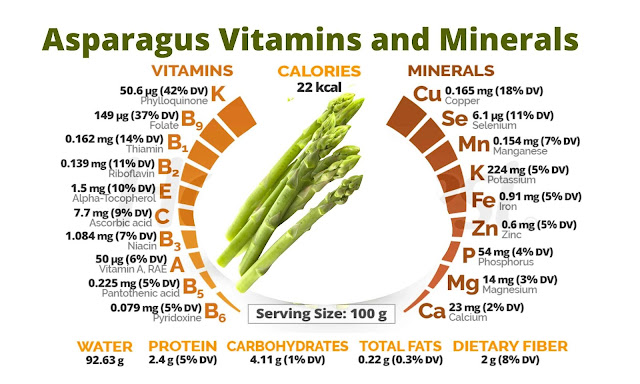 |
| Asparagus Vitamins and Minerals |
Asparagus is a popular vegetable and it is a member of the lily family. It has a variety of colors including green, white and purple. They are known as one of the delicacies of the vegetable in the world with a price tag to match and have an intense savory flavor.
In this post we discuss the basics of Asparagus Vitamins and Minerals, then we have discussed Twelve Major Health Benefits of Asparagus.
Generally French asparagus color is purple and the British and American asparagus is green. On the other side, Dutch and Spanish asparagus is white because it's grown beneath the soil and cut just as the tips emerge.
It contains all types of nutrition With high levels of vitamins A and C, iron, and calcium.
 |
| Asparagus |
There are so many health benefits to asparagus and it is without a doubt a beneficial vegetable for you to include in your diet. Asparagus is full of nutrients, including many vitamins and minerals. These include vitamins A, B, B12, C6, D, E, and K.
Asparagus also contains many minerals such as calcium, copper, iron, magnesium, manganese, phosphorus, potassium, selenium, sodium, and zinc. Asparagus contains proteins and amino acids, including alanine, arginine, asparagus acid, cysteine, glutamic acid, glycine, histidine, lysine, proline, serine, tryptophan, tyrosine, and Blaine, just to name some.
This vegetable has many essential fatty acids, carbohydrates, fibers, sugars, and more. Due to its extremely high contents of nutrients, asparagus is good for a long list of purposes. These include weight loss, treating constipation, treating depression, fertility, blood pressure control, ridding of kidney stones, rheumatic arthritis, epilepsy, chronic fatigue, and more.
The anti-inflammatory and antioxidant properties of asparagus help in neutralizing free radicals that are released in the body. These properties also help fight off fatal diseases like type two diabetes, cancer, and heart disease.
Asparagus serves the body in almost any way you can think of. It maintains the health and functioning of just about every body part, thanks to its nutrients. And if you're feeling blue, don't forget that asparagus is also extremely helpful for your immune emotional help.
Let's know the Major Health Benefits of Asparagus.
Controls homocysteine levels
 |
| Asparagus Health Benefit |
In the human body, a deficiency of vitamin B can elevate the levels of homocysteine and increase the risk of damage to blood vessels, venous thrombosis in which clotting of blood happens in atherosclerosis, veins, and other cardiac disorders.
And also, Vitamins B plays important role in maintaining healthy levels of blood sugar by ensuring proper metabolism of stretches and sugars in our body.
AIDS digestion
Asparagus contains significant quantities of the nutrient annually, which is a kind of complex carbohydrate commonly known as prebiotic. It does not get digested until it reaches the large intestine where it is fed upon by a kind of good bacteria like lactobacilli.
Insulin AIDS in the improved absorption of nutrients. It has laxative properties and it is also a good provider of dietary fiber that helps in the smooth functioning of the bowels. Helps in lowering the cholesterol level of the body and also Keeping Bloating and Constipation at bay along with healthy digestion fiber.
It is widely recommended in Ayurveda therapy for its effectiveness in curing diarrhea dysentery and Dyspepsia, which is a feeling of abdominal discomfort including burning sensations or naval pain occurring during or after eating. Studies have shown that asparagus hypnosis has been proven to be as effective as the commercially available modern drugs in treating Dyspepsia.
Improve Digestive Health
Dietary fiber is essential for good digestive health. Just half a cup of asparagus contains 1.8 grams of fiber, which is 7% of your daily needs. Research suggests that a diet high in fiber-rich vegetables and fruit may help to reduce the risk of high blood pressure, diabetes, and heart disease. Insoluble fibers particularly exist in Asparagus, which adds bulk to stool and supports regular bowel movements.
A small amount of soluble fiber exists in asparagus, that dissolves in water and forms a gel-like substance in the digestive tract. Friendly bacteria live in the gut such as bifidobacteria and lactobacillus, and soluble fiber feeds them.
Increasing the number of these beneficial bacteria plays a role in producing essential nutrients like vitamins B12 & K2, and strengthening the immune system.
As a part of a fiber-rich diet eating asparagus is an excellent way to help meet your fiber needs and keep your digestive system healthy.
Helps Lower Blood Pressure
High blood pressure affects more than one 3 billion people worldwide and is a major risk factor for heart disease and stroke.
Research suggests that reducing salt intake and increasing potassium intake is an effective way to lower high blood pressure. Potassium lowers blood pressure in two ways by relaxing the walls of blood vessels and excreting excess salt through urine. Asparagus is a good source of potassium, providing six percent of your daily requirement in a half-cup serving.
Research also said that asparagus may have other blood pressure-lowering properties. In the case of eating more potassium-rich vegetables, asparagus is a great way to help keep your blood pressure in a healthy range.
Can Help You lose Weight
 |
| Can help with Weight Loss |
Although, there has been no official research published yet on the effect of asparagus on weight loss. But asparagus has a number of properties that could potentially help with weight loss.
One of these is "Low in Calories", study says that only 20 calories exist in half a cup of asparagus, which means you can eat a lot of asparagus without taking a lot of calories. Furthermore, it contains 94% water.
Research suggests that consumption of low calories with water-rich foods helps to weight loss. Asparagus is also rich in fiber that has been linked to weight loss and lower body weight.
Good Source of Antioxidants
Antioxidants are compounds, that play an important role to protect our body's cells from the harmful effects of free radicals and oxidative stress. Oxidative stress is very harmful to the human body, it contributes to aging, chronic inflammation, and many diseases including cancer.
Asparagus is also high in Antioxidants like other green vegetables. Also Vitamin E, Vitamin C, glutathione, flavonoids, and polyphenols exist in asparagus.
Asparagus is particularly high in the flavonoids QuartetIn, isorhamnetin, and Cameroon. These substances have been found to have a blood pressure-lowering anti-inflammatory, antiviral and anticancer effects in a number of human test-tube and animal studies.
Purple asparagus contain Anthocyanins. A powerful pigment is called Anthocyanins, which give the vegetable its variant color and have an antioxidant effect on the body. Even, increasing anthocyanin intake has been shown to reduce heart disease, blood pressure, and the risk of heart attacks.
Asparagus eating along with other fruits and vegetables can provide your body with a range of antioxidants to promote good health.
Easy to Add to Your Diet
 |
| Asparagus Health Diet |
In various ways, asparagus can be cooked including boiling, steaming, grilling, roasting, and sauteing.
You can also eat canned asparagus, it is precooked and ready to eat. Asparagus can be used in a number of dishes like salads, stirfries, frittatas, omelets, and pasta, and it makes an excellent side dish.
Regulates blood cholesterol level
Studies have supported the fact that the wealth of antioxidants and asparagus have the potential to treat oxidative stress.
Relieves depression
Scientific research has shown the efficacy of Asparagus osmosis as an antianxiety and antidepressant drug. It helps in enhancing memory, increases the production and secretion of estrogen, and has a revitalizing and calming effect on the nervous system.
Asparagus is a healthy superfood that provides all the essential nutrients that will help you live a healthier life.
After the addition of asparagus to your diet plan, a youthful and active lifestyle is sure to follow. Thanks for watching. Don't forget to, like, share, and subscribe to our channel to stay updated with our videos on food and nutrition.
In a simple word, Asparagus is a tasty and nutritious addition to any diet. With low calories, It is a great source of nutrients including fiber folate, and vitamins A, C, and K. Also, asparagus eating has a lot of benefits including lower blood pressure, improve digestion, weight loss, and healthy pregnancy outcomes.
The most surprising matter about asparagus, it is inexpensive, easy to prepare, and makes a delicious addition to a number of recipes.
Related Post:
What is the Real Secret to Losing Weight,

Post a Comment